Sharif University Dean Fired For Graduation Ceremony Controversy
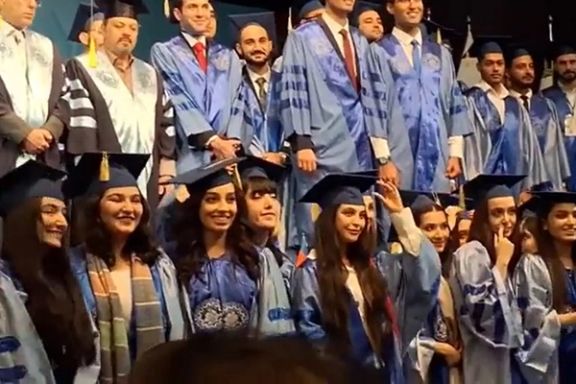
Following the furore over students being allowed to attend a graduation ceremony without mandatory hijab, the dean of Iran’s Sharif University has been fired.

Following the furore over students being allowed to attend a graduation ceremony without mandatory hijab, the dean of Iran’s Sharif University has been fired.
Mohammad Ali Zolfigol, the Minister of Science, issued a decree removing Rasoul Jalili from his position and introduced Abbas Mousavi as the new acting head of the university.
The graduation ceremony for 81 students from the international campus of Sharif University of Technology took place on Kish Island last Thursday. According to videos shared on social media, many female graduates were seen without mandatory hijab, wearing graduation uniforms.
Following that, the chancellor of Kish campus was dismissed. On Saturday, the AmirKabir Telegram channel reported that, following threats from the ministries of science and intelligence, Ali Selk Ghaffari, the chancellor of Kish campus, had been "forced to resign."
The dismissal will come as a shock for many, knowing Jalili as a key figure in the Khamenei inner circle. In 2012, Jalili was appointed as a member of the Supreme Council of Cyberspace by the decree of Supreme Leader and was previously named as one of the organizers of "digital suppression," leading to his inclusion in the US sanctions list.
Since the protests following the death of Mahsa Amini in morality police detention, many students, especially female ones, have openly and practically opposed mandatory hijab. As dissent deepens, universities have stepped up security and surveillance, in line with that seen across public spaces in Iran.
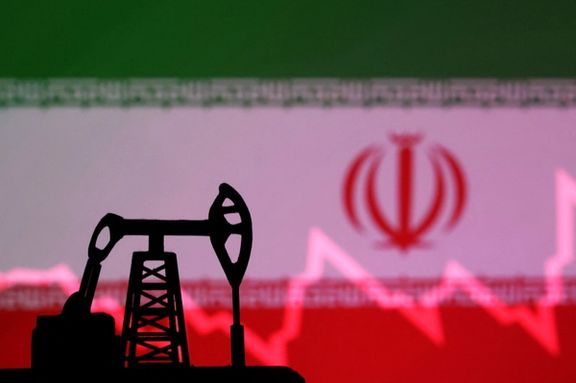
Iran’s oil production should increase from 3.4 million barrels per day to 3.6 million by the end of the Iranian year on March 20, Oil Minister Javad Owji said on Tuesday.
"We aim to reach 4 million barrels per day of oil production for next year," Fars news affiliated with the Revolutionary Guard cited Owji as saying, referring to the next Iranian year starting March 20, 2024.
Iran has increased its daily crude exports to around 1.5 million barrels this year, but a substantial part of the shipments came from stockpiled oil on tankers and ground facilities. These stocks have dwindled and if Iran wants to keep up the pace of exports, it has to increase production.
A regional oil expert told Iran International that in mid-2022, Tehran had a stockpile of 115 million barrels, but it sold most of the oil and now has 27 million barrels left, barely enough to sustain one month of exports.
China is the main buyer, despite full US sanctions imposed on Iranian oil exports in May 2019. Initially, Iran’s shipments dropped significantly to around 300,000 barrels per day, but after the Biden administration launched indirect talks with Tehran to revive the JCPOA nuclear deal, Chinese purchases increased. Many believe that the United States has been soft on cracking down, in order not to jeopardize chances for a nuclear deal.
The oil minister praised the current government for making substantial investments in the oil and gas sectors. He stated that 132 projects have been completed at a cost of $28.5 billion and there are 50 other planned projects that will cost $47.5 billion.
These numbers seem to be too high given Iran’s financial crisis, with the national currency near its all-time lows at 500,000 per US dollar and inflation surpassing 50 percent. If the government is investing its windfall revenues from increased oil exports back into the oil industry, it could be considered a great planning. However, no one knows how much Iran earns from its oil exports, as it is categorized as a national security matter.
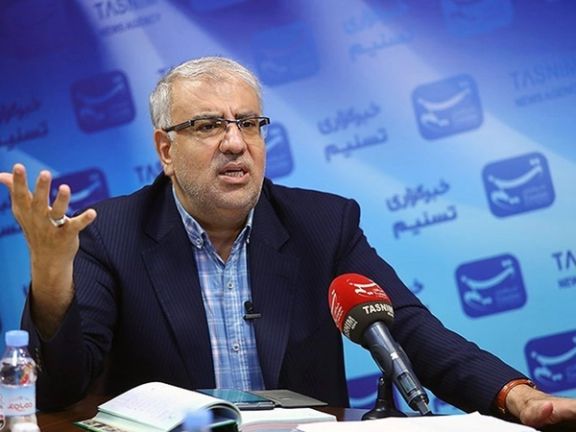
However, Owji’s pledge to boost production faces its own challenges. Iran has a serious shortage of natural gas, despite holding the world’s second biggest reserves. The government is juggling between ever-increasing domestic consumer and commercial demand and its need for power generation, exports and using needed gas for oil production.
To prevent a rapid decline in production, Iran needs to re-inject nearly 300 million cubic meters of gas per day (mcm/d) into its old oil deposits. However, the latest available official data reveals that the actual daily gas re-injection in 2018 was less than 37 million cubic meters. The situation must have deteriorated even further in the past five years, as gas production rapidly declines. Its daily production hardly reaches 800 mcm.
In addition, advanced foreign technology is needed, which is very difficult to secure amid US sanctions. The lack of technology hurts both gas and oil production. Even the Chinese and the Russians have not been wiling to render any significant assistance.
In the meantime, Iran’s economy minister revealed on Tuesday that the government is basing next year’s budget on daily exports of 1.35 million barrels per day, which is realistic. However, the price the government expects to get at 65 euros per barrel seems greatly optimistic. Given Iran’s current tight state of finances and shortages of foreign currencies, it is more likely that it offers steep discounts to buyers or loses money in the process of illicit oil shipments.
In previous years also the budget was based on rosy calculations and then faced huge deficits. At least half of the government’s operating budget comes from oil exports.
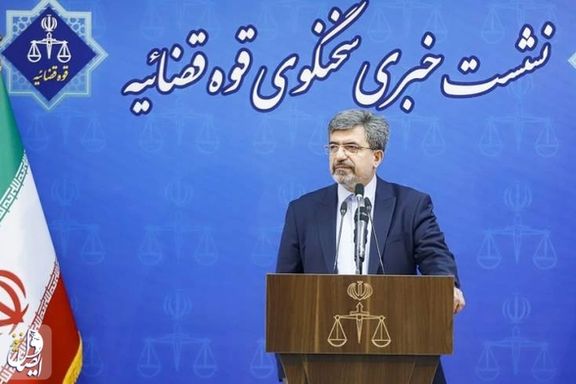
Masoud Setayeshi, the spokesperson for Iran's Judiciary, has called on the Swedish appeal court to ensure a fair and correct proceeding for former Iranian jailor Hamid Nouri.
Nouri, a former deputy prosecutor at Gohardasht Prison near Tehran was sentenced to life in prison by a Swedish court last year for his alleged role in the purge of political prisoners in Iran during the 1988 killings.
Speaking on Tuesday, Setayeshi emphasized the need for the judge to conduct the proceedings with “correctness, honesty, and without bias, considering both God and the law.” He cautioned against the influence of “political atmospheres, highlighting the importance of adherence to principles of justice and legality.”
Setayeshi's call flies in the face of the fact that the Iranian regime regularly conducts unjust court proceedings and delivers biased rulings. Innumerable sentences have been given without fair trial or proper legal representation. Both historical records and recent evidence by legal experts and rights groups suggest that the death penalty is wielded by the Islamic Republic as a means of political repression, particularly to instill fear among opposition forces. In trials that may result in death sentences for defendants, Iran's Judiciary prohibits protesters and dissidents from selecting their legal representation.
In Iran, individuals on trial for crimes against national security can only be represented by lawyers with the "endorsement" of the chief justice. Dissidents facing charges related to national security, insulting the Supreme Leader, or unlawful assembly often have limited options for legal representation.
Protesters are sometimes charged with offenses such as "corruption on earth" or "waging war against God," both of which carry the death penalty. Iran's revolutionary courts have sentenced numerous protesters to death on such charges, with seven executions reported so far and others facing the same fate.

The Iran Migration Observatory (IMO) has raised alarms over what it describes as an "uncontrolled mass emigration" currently occurring in Iran.
According to data from the Organization for Economic Co-operation and Development (OECD), Iran witnessed the world's fastest growth in migration rates to wealthy countries between 2020 and 2021, with numbers soaring from approximately 48,000 in 2020 to 115,000 in the following year—an increase of 141 percent.
An analysis conducted by the IMO, using data from the UN Refugee Agency (UNHCR), revealed that the number of new asylum applications globally by Iranians in 2022 increased by 44 percent compared to the previous year.
Simultaneously, the IMO reported that the number of Iranians studying abroad has been on the rise for eight consecutive years, climbing from 49,000 in 2013 to 70,000 in 2021.
Economic and political factors are identified as the primary drivers behind the mass migration. Iran has grappled with an inflation rate exceeding 40 percent for the past four years, exacerbated by US-led sanctions imposed over Tehran's nuclear program. Additionally, a heavy crackdown on dissent, following mass protests triggered by the death of Mahsa Amini in police custody, and continued geopolitical tensions contributed to the exodus.
Traditionally, Iranian migrants have sought destinations in the US, Australia, Canada, and Europe. However, the ongoing development in the Persian Gulf region has made Arab states such as the UAE, Qatar, and Oman increasingly attractive for job seekers. Turkey has also gained popularity as a destination in recent years.
The departing population comprises not only professionals like athletes, artists, skilled workers, and technicians from the affluent elite but also a significant number of poorer Iranians attempting perilous journeys to reach western countries.
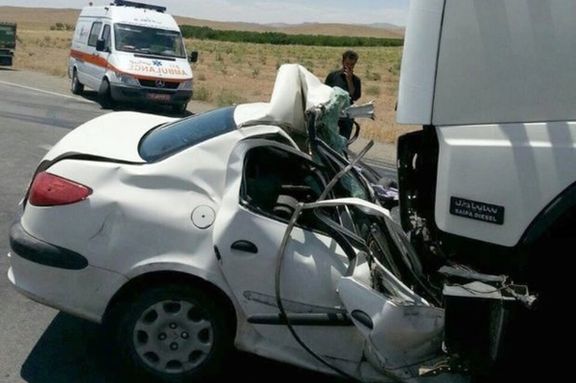
The head of Iran's Traffic Police, Hassan Momeni, reported a surge in road accidents across the country.
During a press conference held in Tehran on Tuesday, Momeni disclosed that over 20,000 lives were lost in the past year due to road-related incidents.
Last year, 17,000 deaths were recorded between March 2021 and March 2022.
The Traffic Police head provided a historical perspective, revealing that in the 2000s, the annual death toll reached 28,000 but gradually decreased to around 16,000 in 2016.
Identifying key factors leading to accidents, Momeni underscored “excessive speed, lack of attention to the road, overtaking, fatigue, and drowsiness as the primary causes.”
Nowruz, the Iranian New Year holidays, emerged as one of the deadliest periods for road accidents. This year alone, the country witnessed a staggering 85,000 accidents and 871 reported deaths during the Nowruz holidays (March 21- April 2).
However, Teymour Hosseini, the Traffic Police deputy chief downplayed the country’s poor and ageing vehicle standards and the dangerous quality of the country's roads which lack maintenance, as significant contributors to accidents.
Additionally, authorities in Iran say that 43% of traffic accident fatalities lose their lives after being transferred to the hospital, citing "failure to diagnose brain injury or internal bleeding" and "medical errors" as key causes.
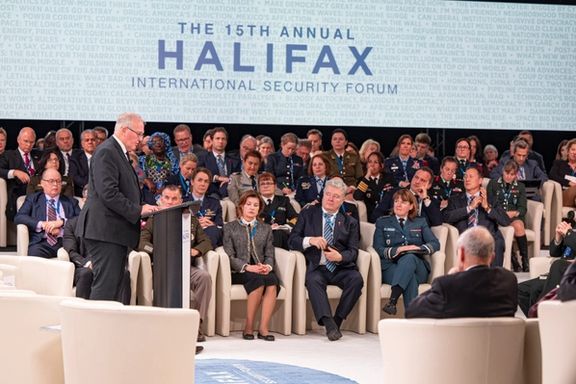
Senior scholars held an event in Canada, discussing pressing global security concerns with a focus on the alliance by China, Russia, Iran and North Korea (CRINK).
About 300 influential Western figures, including military leaders, lawmakers, diplomats, scholars, and activists wrapped up the 2023 Halifax International Security Forum (HISF) Sunday, after three days of expert panels covering a wide range of topics. The discussions revolved around the challenges posed by CRINK, an acronym derived from the initials of the four nations that have been directly or indirectly involved in numerous military conflicts worldwide.
The summit delved into various themes, with a significant emphasis on the ongoing conflict in Ukraine and the conflict between Israel and Hamas. Notably, the alignment of China, Russia, Iran, and North Korea was identified as a substantial threat to the established world order. Leaders of these countries, including Iran’s ruler Ali Khamenei, have repeatedly talked of a new global order not based on Western values.
After opening remarks on the first day of the event, Canada’s Minister of National Defense Bill Blair -- who co-hosted the 15th annual forum with the founding President of forum Peter Van Praagh -- answered to Iran International's Mahsa Mortazavi who asked about Canada's possible plans against the Islamic Republic's influence and its entrenchment into the Canadian society.
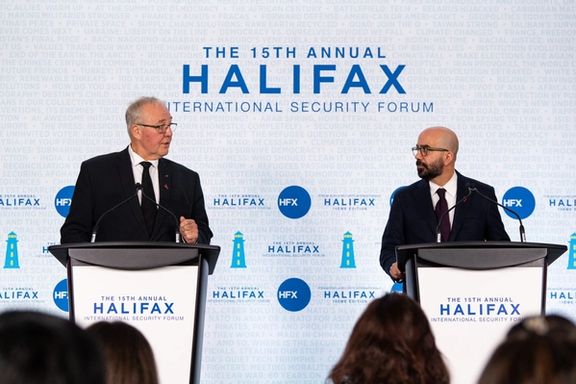
“Canada has already listed Iran as a state sponsor of terrorism which on a level of international law is a very significant and serious determination,” Blair said, when asked why Canada is not following its ally the US in designating Iran’s Revolutionary Guards as a terrorist organization. He noted that “part of Iran's export of terrorism is through the Quds force,” referring to the IRGC’s extraterritorial wing. “We've already listed those as a terrorist entity.”
About agents of Iran’s Revolutionary Guards active in Canada, Blair said, “I want to assure Iranian Canadians we understand how concerning the activities of the IRGC is. We believe that it is necessary to do more, and that work is ongoing.”
In one of the panel discussions, US Senator Jim Risch (R-ID) argued that the Middle East conflicts are fueled and funded by the Islamic Republic. “It is all Iran, whether Hamas, Hezbollah or Houthis, it is all Iran.”
Masih Alinejad, in a panel discussion with some fellow dissident activists, said “It's a shame that the US government designated the Revolutionary Guards as a terrorist organization, but the US allies are still hesitating to do the simple thing.”
Claiming that Iran’s Khamenei, Russia’s President Vladimir Putin, China’s Xi Jinping are “more united than Democratic countries,” Alinejad called for specific measures to counter the global threats Iran poses. "First, criminalize the Revolutionary Guards as a terrorist organization," she said, adding that the second is ridding Canada from the IRGC agents. She claimed there are over 700 IRGC agents "living luxury lives” in Canada. “Kick them out not because they are the threats for us Iranians, they are threats for democracy; for Canadians as well.”
Participants expressed concerns about the volatile situations in the Middle East, the South China Sea, and the Russia-Ukraine conflict, considering them potential hotbeds that could escalate into broader global conflicts. There was a consensus among democratic nations that unity is crucial to counterbalance the influence of the CRINK alliance.
Islamic Republic hardliners claim that closer economic and political relations with the East and Asian countries, which Khamenei has promulgated with the catchphrase "Looking East", will help Iran's development and strengthen it against Western powers, particularly the United States. Since 2018, and Khamenei's advocation of the policy, "Looking East" has become one of the centerpieces of a 'revolutionary economy' which hardliners have been hard at work to theorize and promote.
Almost all the experts were unanimous that the Middle East, particularly the ongoing Israel-Hamas war, and the crisis in South China Sea over Taiwan are the critical flashpoints, from which the conflicts can escalate into bigger wars. Additionally, the Russia-Ukraine conflict was highlighted in several panels, with global leaders stressing the importance of supporting Ukraine in resisting the Russian aggression.
Activists and experts urged the US to send a significant amount of weaponry so that Ukraine can come out a winner from the almost two-year war with Russia. Garry Kasparov, a former World Chess Champion-turned-political activist, told US military men present at the event that the arms needed by Ukraine to win the war “are collecting dust in Pentagon storehouses.”
The Halifax International Security Forum presents an award annually in honor of US Sen. John McCain, who died in 2018, to “individuals from any country who have demonstrated uncommon leadership in the pursuit of human justice.” “On the 75th anniversary of Israel’s creation, and in the aftermath of the October 7 attack that resulted in the greatest loss of life to the Jewish people since the Holocaust, it is fitting to present an award that bears Senator McCain’s name to: The People of Israel,” a statement by the security forum read.
As the HISF concluded, the consensus among democratic nations was clear: a united front is essential to address the destabilizing activities orchestrated by the CRINK alliance and to uphold the principles of the global world order.
Journalist Josh Rogin, who hosted one of the panels, said, “The bottom line is that … we're entering into a bipolar world... our adversaries are teaming up against us in Ukraine, in Israel, in Europe, and in the Pacific.”
“Iran is arming Russia and Hamas; North Korea is exporting weapons to Russia to use against Ukrainians; Russia and China are teaming up to help Hamas diplomatically; and China is helping Russia and Iran evade sanctions and continue their aggression,” he said, stating that “these conflicts are intertwined and therefore our response needs to be intertwined.”
As Kasparov put it, the leaders of CRINK exactly say what they are going to do, and they are delivering on their promises. He explained that Putin had talked of annexation of lands he deemed as part of Russia, or China’s Xi has been vocal about taking over Taiwan, and Iran’s Khamenei has been trumpeting his prophecy of Israel’s annihilation. He said the world should take their threats at face value.
“At times like this, conferences like this one matter. Threats to international stability are on the rise – and in the face of those threats, we’ve got to work together. We must learn from one another and share experiences. We must step up to address these challenges, and to preserve peace and prosperity for our peoples. Together, I’m confident that we can build a safer world. We can ensure that our militaries are ready to face the threats of tomorrow. And ultimately, we can protect and strengthen the rules-based international order that keeps us all safe.”
Bill Blair, Canada's Minister of National Defense